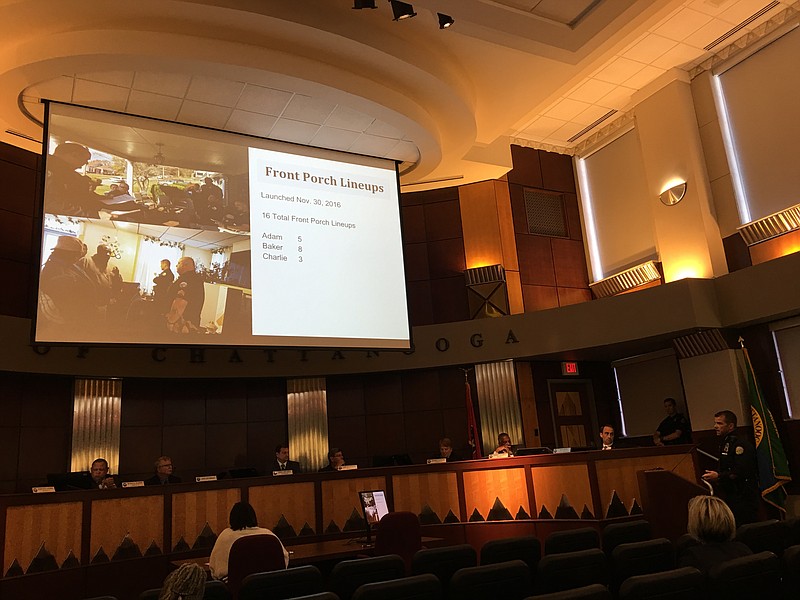Victim Services Unit
For more information about the Victim Services Unit, visit www.chattanooga.gov/police-department/victim-services or call 423-643-5000.
More Info
Chattanooga City CouncilWhat: District 9 community meeting and forum on short-term vacation rental rulesWhere: Glenwood Youth and Family Development Center, 2610 E. Third St.When: Tonight at 6 p.m.
The Chattanooga Police Department says it wants to erase barriers between it and the community.
In a recent city council meeting, Chief of Staff David Roddy outlined new programs aimed at doing just that: front porch lineups and the Victim Services Unit.
"This uniform, in certain settings, does not encourage open communication, especially with individuals who may not have had positive interactions with law enforcement due to their lives," Roddy said.
While police can't shed their uniforms, they can change the setting where they interact with the members of the community, he said.
In November, the department reached out to neighborhoods across the city to find people who would be willing to host lineups, when police officers begin their shifts and take note of intelligence and other developments reported by the last shift.
Roddy said the department received dozens of offers and has completed 16 front porch lineups so far.
The lineups give people a chance to tell officers what they see in their neighborhoods, their experiences with law enforcement and their expectations of the police, Roddy said.
"It starts real conversations," he said.
Front porch lineups call for officers to park a few blocks away from the host home and walk, giving them a hands-on familiarity with the neighborhood, Roddy said.
Not only does this build relationships, it helps officers make better security assessments when they respond to calls for service in that neighborhood, he said. Being able to recognize people and vehicles keeps officers from unnecessary distraction when making security assessments.
"So when they get out on that call for service, they don't have that cynical look that can separate us from the community," Roddy said.
The front porch lineup initiative has received the kind of responses the department wants, Roddy said. Results are tracked and measured monthly.
Councilwoman Demetrus Coonrod commended Roddy for launching the program and said she would be interested in hosting a front porch lineup at her home.
"I think it's very important for the African-American community because a lot of us don't have trust and haven't had opportunities to build relationships with police officers that are there to serve and protect," Coonrod said.
She called for overcoming the mutual fears of police officers and the communities they protect.
Councilman Russell Gilbert told Roddy the police department was on the right track by interacting with people in their neighborhoods.
"Once you start talking with one another, you start learning how people think, what they do and then you start working together as a team, and I appreciate that," Gilbert said.
Caroline Huffaker, coordinator for the Victims Services Unit, asked the council to look beyond the statistics to understand the real needs and fears of the people she and her staff of two seek to help.
Victims who agree to testify against violent offenders may face potentially life-threatening consequences, she said.
"We forget that this is a voluntary system that they participate in as a victim and a survivor of crime," Huffaker said.
The unit's goals on the Chattanooga Police Department's website are to "partner with officers, investigators and community colleagues to create a network of care and support for victims of violence" through direct services, follow-up care, advocacy and criminal justice support.
The group also trains police to help them better respond to violent crime victims.
Victim Services Unit figures show they have provided 442 instances of crisis counseling and logged nearly 2,200 follow-up contacts in seven months of operation.
Helping victims sometimes means protecting them from retaliation, Huffaker said.
"It's a very real fear for people and it's our job as the criminal justice system to meet that head on," she said.
She mentioned victims who last year sought justice for Rashaud Taylor, 23, and Jasmine Hines, 22, who lost their lives in last year's Labor Day double homicide.
It took a wide spectrum of services, including relocation, to secure their safety and testimony, she said.
"Chattanooga was no longer safe for some of them," Huffaker said.
Moving them to a new town meant helping with housing, employment and connections to services, she said. It also meant getting them safely into and out of Chattanooga to testify.
Money is the biggest challenge facing the Victim Services Unit, which is mostly funded by grant dollars, she said.
Councilwoman Carol Berz recommended the council plan ahead for local funding in light of potential cuts in federal grant dollars.
Roddy said he would have a better idea of city funding needed to bridge any shortfalls once the department knows how much federal and state money it can receive.
"This is something that is changing the mindsets of our officers, it's changing the rapport and the trust that we've established in the community," Roddy said. "It is not something that goes away. In my opinion, the only real option for this program is that it grows."
Contact staff writer Paul Leach at 423-757-6481 or pleach@timesfreepress.com. Follow him on Twitter @pleach_tfp.
